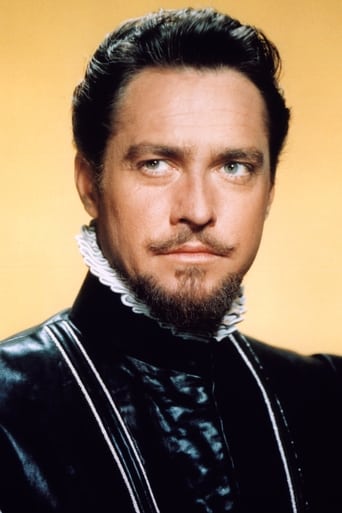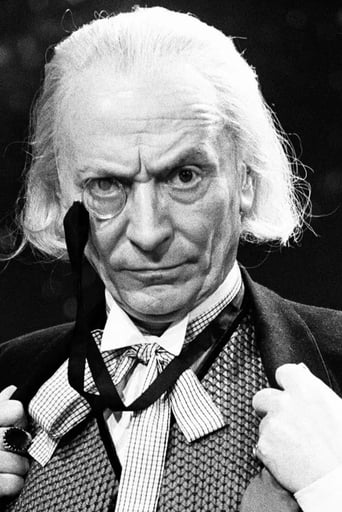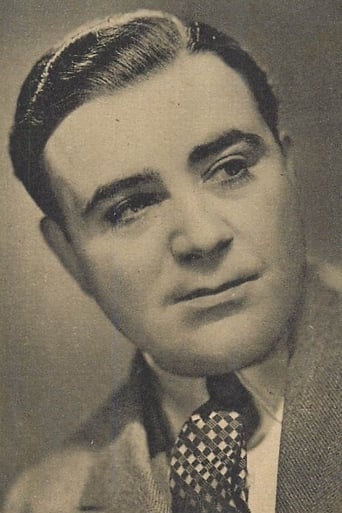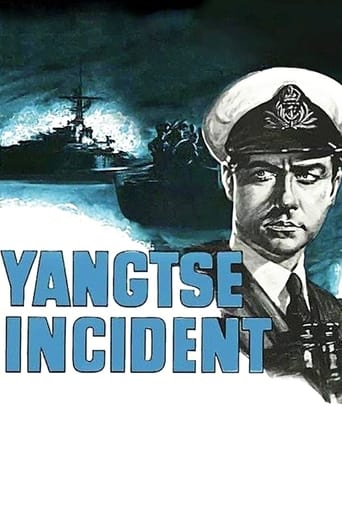
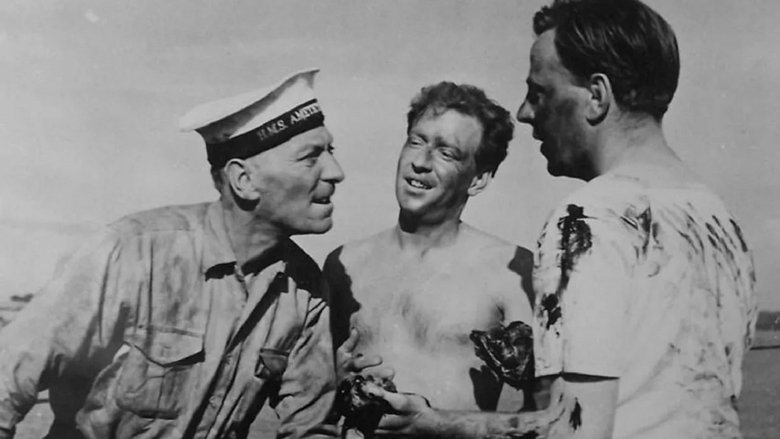
Yangtse Incident: The Story of H.M.S. Amethyst (1957)
While sailing lawfully up the Yangste in 1949, the British warship Amethyst found its return to the open sea blocked by Communist Chinese shore batteries that unexpectedly opened fire. In charge, Lietenant Commander Kerans was not however prepared for his crew and his ship to remain as a hostage for the Chinese to use as an international pawn.
Watch Trailer
Cast


Reviews
I like movies that are aware of what they are selling... without [any] greater aspirations than to make people laugh and that's it.
Strong acting helps the film overcome an uncertain premise and create characters that hold our attention absolutely.
It is an exhilarating, distressing, funny and profound film, with one of the more memorable film scores in years,
Actress is magnificent and exudes a hypnotic screen presence in this affecting drama.
When the frigate HMS Amethyst set off up the Yangtse river to resupply the British embassy in Nanking nobody on board thought they would end up national heroes after the People's Liberation Army shell the ship killing several crew members, driving it onto a sandbar and demanding an apology from the crew before they can make a dramatic escape through what is now unfriendly territory.As the film opens the Amethyst is steaming up river with little to worry about, they know there is a civil war in China but don't know just how close the PLA are to taking the capital. When they come under heavy fire from communist artillery they are damaged and driven onto a sand bar. It appears they will be rescued when the destroyer HMS Consort arrives, unfortunately even with its superior fire power Consort can't silence the Chinese guns and after taking casualties is forced to retreat. The wounded personnel are evacuated to the river bank still in Nationalist hands and taken overland to Shanghai. The wounded include the captain who dies of his wounds. Lieutenant-Commander Kerans is sent to take over the command. As the Communists make further advances they are totally cut off from friendly forces and have to try to negotiate their safe passage unfortunately the Chinese demand that the crew confess that they were the aggressors. Refusing to do this Kerans decides they will make a run for the sea on night. To do this they must run the gauntlet of Chinese batteries and avoid a boom that has been placed across part of the river.This film is an exciting retelling of those events with a solid cast portraying the ships crew, the only weakness in the cast is having Akim Tamiroff, a Russian playing a Chinese officer, he just didn't look or sound Chinese. The fact that it was filmed aboard the real HMS Amethyst added authenticity; when they come under fire it looks like a real ship is coming under fire not just a model.
In 1949, a British destroyer, HMS Amethyst, is proceeding along the Yangtse River in China on a peaceful mission to bring supplies to Nanking. However, a revolution is going on, the Chinese People's Liberation Army ("the Commies") have occupied one side of the river and shore batteries fire without warning on the ship.The Amethyst sustains serious casualties and plows into the mud just out of range of the Chinese guns. Attempts to tow her off fail. Mao Tse Tung's army captures Nanking, so the Amethyst's mission is aborted. And, of course, there are now still more batteries along both shores of the river, blocking the Amethyst from the open sea. The grounded warship is visited by negotiators from the Chinese Liberation People's Republic Communist Marxist Invulnerable Heavenly Army Horde. They're willing to return some prisoners, allow the ship to be provisioned, and then proceed down the river to the sea. The only condition imposed by the humorless Chinese negotiators is that the British sign a statement that the whole affair was their own fault.The captain of the Amethyst has been killed and his executive officer disabled, so they are removed along with the rest of the wounded to a hospital. A new captain arrives. This is Richard Todd. He's fair, stern, competent -- but what to do? Well, let me not spoil the ending by revealing that they slip away virtually unscathed at the last minute.The story is so nicely structured in dramatic terms that it's hard to believe it hews close to history. It opens peacefully, turns at once into a furious battle, followed by a long mid-section involving negotiations between Todd and Akim Tamiroff as the Chinese Negotiator in Chief of the Chinese People's Heavenly Sent Liberation and Degaussing Army and Exalted Perloo Society. Then, when the end finally rolls around, the stress builds as the ship prepares to slip her chains and creep down the river to sanctuary.Very little model work is used. This is to the film's advantage because models, no matter how sizable, are almost always identifiable for what they are. The texture is usually all wrong. Shell splashes send up towers of water with drops the size of basketballs. This movie uses real ships, and British destroyers were beautiful crafts. It's a pleasure to watch them in motion.Acting. Richard Todd is a bit stiff, as usual, but his rigor fits the template of the role perfectly. I mean, what we don't need in this tense war drama is a captain who sits around conducting Gestalt group sessions with the men. Ian Bannen can be seen in a small role. He was to go on to become a marvelous and innovative performer. Also briefly visible is Barry Foster, who was a fanatic IRA man in "Ryan's Daughter" and a sex maniac in Hitchcock's "Frenzy." I was pleased to see that the script made a modest hero of Frenchy, the wireless operator. I was one myself and I can say without fear of contradiction that we are an under-appreciated lot.One performance stands head and shoulders above the others, and that's Akim Tamiroff, a Russian, who essays the role of a gruff and manipulative communist negotiator, as Chinese as a plate of beef Stroganoff. My God, he must have laughed himself to sleep every night! What a ludicrous performance. The make-up alone -- that broad false nose, those pasted-back eyelids. And that semi-Chinese accent imposed on a Russian accent imposed on English dialog. You must hear him try pronouncing "original memorandum" to believe it. The only person who seems able to speak Chinese properly is Keye Luke as the Area Garrison Commander, probably because he was born in Guangzhou, China. When he first boards the frigate, he turns to his aid and says in Mandarin, "You wait here; I'll be back." I was happy to understand it, because it's all I remember after one nightmarish summer of studying Mandarin in New Haven. Sure, Act Two is long and slow, but it's propelled by a good deal of tension, and the heat and boredom suffered by the men provides a neat contrast with the cathartic relief of the final escape. The script doesn't avoid all the clichés ("You mean, you're scared too?") but there aren't many, even though I'm beginning to suspect the musical score was written by Richard Wagner. It's an exciting story nicely transposed into film.
A splendid rendition of a true story. Richard Todd essentially does Guy Gibson at sea, arriving after the battle to save the ship.The battle sequences are exciting, and you really feel under fire as you watch the perplexed crew cope with the unexpected attack.Unfortunately the film was not shot anywhere near location, and it's pretty clear that we are seeing somewhere in England, not the far east! The naval action and later escape is thrilling, almost as good as "Battle of The River Plate" which remains the finest naval warfare film.We see the British humour of the time, best displayed by William Hartnell, who just about steals the show from Todd.
Brtiain during the 1950's (when it had an thriving film industry) produced a plethora of fine war films, usually in black and white which gave a documentary feel about them and added to the realism and usually used only British actors (When made in colour and Cinemascope and usually with an imported US star they felt more contrived- The Bridge on the River Kwai excepted) Many have gone on to become classics like Ice Cold in Alex, The Dam Busters, The Cruel Sea and Reach For The Sky.Yangtze Incident, the true story of the attack on HMS Amethyst by the Communist forces in China in 1949 is also one of the better ones and a bit unjustly forgotten about. It reunited Richard Todd with his Dam Busters helmer Michael Anderson and was produced by Herbert Wilcox (husband of Anna Neagle) shortly before he went bankrupt. The upper lips of the cast has never been stiffer but the heroics are natural and never overdone and the action scenes are tremendously exciting and all the better for using real and actual ships (The Battle of the River Plate for this reason is such a disappointment because the ships used bore little or no resemblance to the actual ones (exept one the INS Delhi is the actual HMS Achillies), especially the American heavy cruiser portraying the part of the Graf Spee}The acting of the cast is uniformly (sic!) excellent with Richard Todd giving once again a low key but nevertheless authoritative performance( he Jack Hawkins and Kenneth More seem to have the monopoly on this type of role)All in all a good film the king they don't make any more and a pleasant and relaxing way to while a way a couple of hours on a cold wet miserable Sunday afternoon.


